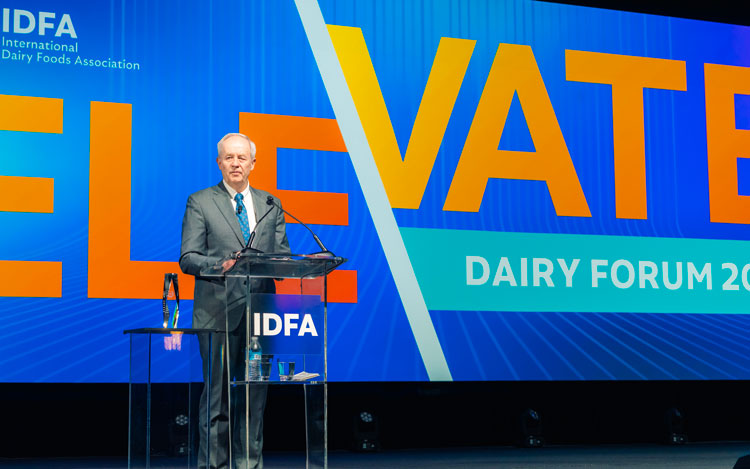
The theme of this year’s International Dairy Foods Association’s Dairy Forum was “Elevate Dairy.” In his opening address, president and CEO Michael Dykes shared a handful of ways we can elevate the dairy industry, and one of them was to reignite our competitive fire.
“The world demands more of our U.S. dairy,” said Dykes, a veterinarian who grew up on a dairy farm in Kentucky. “We need to go take that market. We can become the world’s dominant supplier.”
He emphasized the importance of export opportunities. “We need to make sure that we're uniting on pricing policies that enable us to become globally competitive so we can meet those customer needs and requirements, so that we can become the reliable supplier,” he said.
Dykes shared that the U.S. is currently exporting about 18% of its milk production, but to keep up with projected growth by 2030, exports will need to grow to more than 22% of our production.
“We'll need a game plan for that,” Dykes stated. “We'll need to build globally competitive markets. We'll need to defend against the unfair trade barriers. We'll need to expand our existing agreements and work on new agreements. We'll need to think about new tools and new policies.” He said we also need to form new alliances as well as develop infrastructure such as trucking, railroads, and shipping ports.
He called the U.S. dairy export picture a tale of two worlds, “the best of times and the worst of times.” Although the volume and value of exports were down last year, he applauded the tremendous work done over the last 20 years to get exports to where they are.
Dykes acknowledged some of the unresolved trade issues, such as the TRQ dispute with Canada in the USMCA. And even though the U.S. imported more food and agricultural products in 2023 than it exported, which was the first time in history this happened, he said far more dairy was exported than imported. “We have a good story to tell,” Dykes emphasized.
He also discussed the opportunity to expand our market. India will surpass China as the most populous nation in the world by 2100, and six of the 10 fastest growing economies will be in Africa. Dykes shared that one-third of the global population lives in Africa and India today. “We need to be where the people are. We need to diversify our markets,” he said.
Dykes highlighted the importance of coming together in terms of pricing that works for farmers and processors, so we can meet the needs of international trade and be competitive globally.
“We will be much, much stronger and much, much more effective when we are united,” he concluded.








